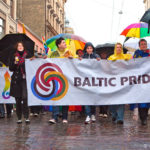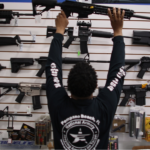Introduction
Here is one of those former Soviet bloc countries where modern “Gay Life in Lithuania” is in conflict with old traditions as the country emerges from the repressive mentality that stigmatized and criminalized homosexuality. Two forces are clashing head on in Lithuania: progressive and tolerant human rights standards of European Union membership and the backward pull of brute aggression and blind prejudice against sexual minorities. 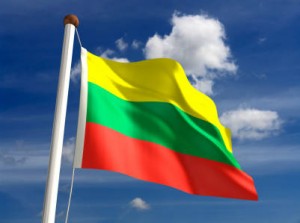 If the skinheads, clergy and most MPs had their way LGBT people would be exiled, jailed, ‘cured’ or exterminated to cleanse the Baltic culture of that sexual’sickness’. A story about gay Lithuanian life is a painful one with twists and turns of anti-gay parliament legislators against constitutional court judges and courageous gay activists in the streets.
If the skinheads, clergy and most MPs had their way LGBT people would be exiled, jailed, ‘cured’ or exterminated to cleanse the Baltic culture of that sexual’sickness’. A story about gay Lithuanian life is a painful one with twists and turns of anti-gay parliament legislators against constitutional court judges and courageous gay activists in the streets.
Homosexuals – the Invisible Citizens of Lithuania
From: balticworlds.com
By Marielle Vitureau
February 19, 2010
The controversy about gay rights and discrimination has resulted in a legislative ‘war’ between Lithuanian prejudicial anti-gay statutes and the European Union’s standards of tolerance and equality.
Since the passing of a homophobic law in July 2009 that was intended to protect minors from the negative effects of public information–including so-called “advertising of homosexual, bisexual and polygamous relations”–critics and defenders have stumbled over then difficult issue of public homosexuality in Lithuania.
Upon assuming office, the new Lithuanian president, Dalia Grybauskaitė, promised to propose amendments to the discriminatory law against homosexuals. Several international organizations which defend human rights, like Amnesty International, had been voicing their outrage. On September 17, the European Parliament adopted a resolution inviting Lithuania to be vigilant in ensuring that their national laws remain consistent with international and European law, and stressed the importance of the fight against discrimination based on sexual orientation.
Her advisers have recently, with input from LGBT organizations, proposed new amendments to this law to the Lithuanian Parliament. The article pertaining to the ban on homosexual advertising, in order, supposedly, to protect minors, will be replaced by a ban on all information which would compromise sexual integrity, particularly that of young children.
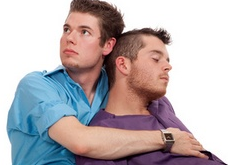 Inga is a young social worker in her thirties who lives with her partner, Greta, also a social worker. “We try to keep our distance from our neighbors, in order to avoid having to explain the nature of our relationship. I would prefer to not have to hide, to have people accept homosexuality as natural”, she explains. “But, on the other hand, I can’t bear the dirty looks anymore, the disapproval. I know exactly how people here react. They call us perverts, deviant. Everyone considers us to be pestilent”, Inga points out, sad and resigned at the same time.
Inga is a young social worker in her thirties who lives with her partner, Greta, also a social worker. “We try to keep our distance from our neighbors, in order to avoid having to explain the nature of our relationship. I would prefer to not have to hide, to have people accept homosexuality as natural”, she explains. “But, on the other hand, I can’t bear the dirty looks anymore, the disapproval. I know exactly how people here react. They call us perverts, deviant. Everyone considers us to be pestilent”, Inga points out, sad and resigned at the same time.
According to a survey by sociologists specializing in gender issues, 38 percent of Lithuanians would distance themselves from a friend who revealed his or her homosexuality to them.
Vladimir Simonko created the Lithuanian Gay Association (now the Lithuanian Gay League) in 1995. Homosexuality had just been decriminalized two years earlier. Approximately 200 people joined the association as volunteers. There are almost no official members of this association. According to Lithuanian law, personal information pertaining to official members would have to be made public. No one in the Lithuanian gay community wants to be put on file in this way.
When he publicly revealed his homosexuality 15 years ago, Vladimir Simonko became a victim. He recalls having been physically assaulted in stores and in streets by people who recognized him, as well as having been verbally abused by neighbors. Since then, he is always on guard when going out, out of an instinct for self-protection.
“I am subject to far fewer acts of aggression directly aimed at me. But that doesn’t mean they don’t exist. Homophobia is moving in a new direction. It’s becoming institutionalized. When deputies adopt homo-phobic laws, there are no assurances that the groups of hate-mongers won’t interpret this as a call to act”, he hammers out, alarmed at the decisions being made by legislators.
“These invisible citizens”, as they are termed by the sociologists who authored a large-scale survey on homophobia in Lithuania, are subject to several forms of discrimination, most notably in the workplace. They do not benefit from any legal recognition or organized communal life, because they are unable to form any type of partnership. For the time being, the formation of a legal, same-sex partnership is made impossible by a resolution adopted by the Lithuanian parliament that states that a family can only be defined as a married couple, composed of a man and a woman.
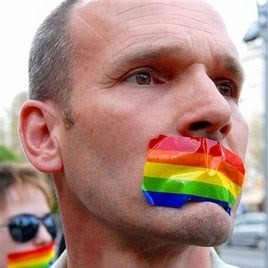 “The primary reason is a lack of education. Many still think that homosexuality is a crime, a disease; the other reason is the weight of the Catholic Church. The Church’s lawyers are involved in the drafting of laws. It is the Church’s position to denounce homosexuality”, says Marija-Ausrine Pavilioniene, a social-democratic deputy. She has often publicly supported Lithuanian gays by marching alongside them in the gay pride parades of Riga and Stockholm.
“The primary reason is a lack of education. Many still think that homosexuality is a crime, a disease; the other reason is the weight of the Catholic Church. The Church’s lawyers are involved in the drafting of laws. It is the Church’s position to denounce homosexuality”, says Marija-Ausrine Pavilioniene, a social-democratic deputy. She has often publicly supported Lithuanian gays by marching alongside them in the gay pride parades of Riga and Stockholm.
Discrimination in the workplace is the most significant, and is still present, despite the introduction, between 2005 and 2007, of a program largely funded by Europe and Sweden and designed to educate employers and employees.
Vytautas Valentinavicius is the president of the Association for Tolerant Youth. He claims to have recently been a victim of discrimination when he requested a day off to participate in the ILGA Conference of the European Association of Homosexuals, held in Vilnius in 2007, and thereby revealed his sexual orientation. “My superiors are still in shock”, he says. He received slanderous messages through his work e-mail. He was also prevented from being promoted. The criteria for a management position excluded him de facto. He did not want to register a complaint with the National Board of Equal Opportunity. “How would I prove a discriminatory act?” asks Vytautas Valentinavicius.
According to Valdas Dambrava, spokesperson for the Board, fewer than a dozen people every year register complaints of discrimination in the workplace due to sexual orientation. The concept itself was first created in 2005, in connection with a new law on equal opportunity. Prior to this date, the law only made guarded against discrimination due to gender. “The greatest sanction against employers occurs when discriminatory acts are made public, and we do receive complaints”, states Valdas Dambrava. Nonetheless, he concedes that not much progress has been made on the issue during the last four years.
On several occasions, the municipalities of the larger Lithuanian cities have halted attempts made by the Lithuanian gay association to inform the public about homosexuality. The so-called Truck of Tolerance, an initiative funded by the European Commission, was denied entry into Lithuania in 2007. The following year, for fear of disturbances, the truck was relegated to the parking 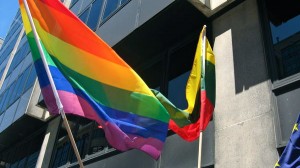 lot of a supermarket by the municipality of Vilnius. Homosexuals wanted to fly the rainbow flag, a symbol of their community. This request was denied by the authorities.
lot of a supermarket by the municipality of Vilnius. Homosexuals wanted to fly the rainbow flag, a symbol of their community. This request was denied by the authorities.
In Kaunas, Lithuania’s second largest city, it was forbidden to affix large ads to the trolleybuses with the following slogans: “A lesbian can be a teacher”, and “A policeman can be gay”. During the ILGA conference in Vilnius, participants were victimized. Demonstrations championing traditional family values, organized by young, right-wing militants, were constantly being held — demonstrations that were sanctioned by the municipality.
Given the situation, as Vladimir Simonko remarks, many young homosexual Lithuanians “seek out places where they are safe to express themselves without discrimination and where they can be themselves, without hiding nor lying, and where they can imagine a future”. In other words, they emigrate.
Vytautas Valentinavicius contends that those who stay in Lithuania lead double lives. “I am personally acquainted with many homosexuals who are married, who have families, and who go looking for sexual experiences in hiding. Our country, Lithuania, forces people to choose to lead a double life. The individuals who reveal their homosexuality at work will never progress in their career”, he affirms.
Voices from the LGBT Community
From Vilnius Life.com
The headlines in the Lithuanian media in the past five years have presented the conflict between gays and straights in dramatic detail, sometimes biased against and sometimes tolerant. As always, behind the bold print and hot button phrases are the real LGBT people whose thoughts and feelings are much effected by the stormy social weather. Here are some of their comments.
From Eric: “People, I do advise not to show off in anyway, cuz it’s the city (Vilnius, the capital) I was born in and do believe me when I say it’s one of the most racist cities in the world when it comes to exposing yourself. Don’t wear anything to flashy or colorful ; no fashion victims on the streets or anything alike. I am not kidding I know the place really well. Soho gay club (in Vilnius) after London’s venues feels like a Soviet Union’s basement club for old pervs to be honest Men’s Factory is not a gay club anymore. Basically there’s no gay scene in Vilnius what soever … So just be careful” (posted in 2011)
Bronius posted the following on his blog: “I recently visited Vilnius, which is the city where my family used to live for generations. I must say I was surprised at how widespread homophobia is, and how hot is the hatred. I live in Poland, in a rather small city of Torun. And people think Poland is homophobic… honestly I don’t know what would I call Lithuania. What you hear from people is so backwards and mind-blowing…” (posted 2010)
 In agreement is Julius: “I’m gay. In Poland vast majority don’t give a flying toss about someone’s orientation. And many people are outright supportive. There are many bigoted people in Poland, but it is vary rare to see someone confrontational or hot with hatred. Homophobia in Poland shows most in gossiping behind someone’s back. In Vilnius people actually get red and shaking when you ask about gay clubs. When you ask about human rights for gay people. Polish minority in Lithuania is not any different. Vilnius looks good on postcards. Lots of bad emotions in people, very bad place to visit. Don’t bother and go to Berlin. Or even to Warsaw, with its vibrant gay scene.” (posted 2010)
In agreement is Julius: “I’m gay. In Poland vast majority don’t give a flying toss about someone’s orientation. And many people are outright supportive. There are many bigoted people in Poland, but it is vary rare to see someone confrontational or hot with hatred. Homophobia in Poland shows most in gossiping behind someone’s back. In Vilnius people actually get red and shaking when you ask about gay clubs. When you ask about human rights for gay people. Polish minority in Lithuania is not any different. Vilnius looks good on postcards. Lots of bad emotions in people, very bad place to visit. Don’t bother and go to Berlin. Or even to Warsaw, with its vibrant gay scene.” (posted 2010)
Aramantas wrote this reaction to the problems of Lithuania and compared its religious influence to other Catholic countries: “Gay rights activists and organizers are vilified in Catholic Vilnius; meanwhile, largely Catholic Mexico has legalized same sex marriage and Brazilian megapolis San Paolo hosted the world’s largest pride event with over three million participants in early June. The greatest changes on the GLBT front are occurring in Catholic Latin America, while strongly Catholic Poland and Lithuania continue to persecute their gay minorities. Upon joining the EU, Eastern Europe seems unable to join the New World. How long will the EU let Eastern European countries demonstrate discrimination towards their minorities?” (posted 2007)
Another comment, from Duncan, offers a more balanced view in his comments: “I am a gay UK man and have visited LT many times, and am aware that Lithuania is a homophobic country. Then again, which country in Europe is not? My own country certainly is. I am aware that not all Lithuanians are homophobic. Many Lithuanians who have worked in the UK, where LGBT people are more accepted, have worked with gays, noticed they are no different to straights, and lost their homophobic opinions. I did not experience homophobia in LT. However, my friend (who is straight and lives in Klaipeda) advised that it is not a good idea for two men to sit close together in a nightclub, in case someone assumes they are an “item.
“When I grew up in England, homophobia was more common than now. We (LGBT people of the UK) have achieved much since then, and still have a long way to go. I am sure that my sexuality was obvious to many Lithuanians, especially to women, but they did not comment. Either they were being hospitable or they were not bothered. I am sure that the situation will improve but it will need more LGBT Lithuanians to come out about their sexuality.” (posted 2008)
Of course not everyone feels the same social stigma as others. Here is another young man, Petras, from Lithuania who has had a very different experience of being gay, “well, I haven’t encountered any homophobic act against me in my life. not a long life (23), but still… Most of my friends know about me and they are ok with it; there are some angry people but they are everywhere in the world… for me everything is fine.” (posted in 2011)
And finally, Jonas had this to say: “I saw Gay Pride 2010 in Vilnius and it was very strange; a small, shy demonstration with mostly foreign people, including Polish supporters, looking like a protest of workers at a supermarket. In Warsaw was Europride and it was great with about 10 000 participants, funny clothes, drag queens, handsome shirtless men and thousands of ordinary Poles with kids watching parade on all route, smiling and taking photos. Right-wing hooligans were about 300 and they weren’t able to disturb the parade. Comparing to Vilnius, Warsaw is a heaven for gays. Lithuania, it’s your shame!” (posted 2010)
The Legal Situation
Since the country’s 2004 EU accession, the situation of the LGBT community has neither improved nor worsened, mainly because the government does not feel obligated to actively advocate for LGBT rights despite the pressure from the EU.
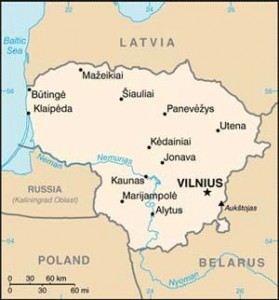 Male and female same-gender sexual activity have been legal in Lithuania since 1993, however gay-marriage and civil same-sex partnership are not officially recognized. The Soviet historic legacy has denied full rights for gays and lesbians. However, as required for admission to the European Union, protections against LGBT discrimination were reluctantly approved by parliament and the age of consent was equalized at 14 years.
Male and female same-gender sexual activity have been legal in Lithuania since 1993, however gay-marriage and civil same-sex partnership are not officially recognized. The Soviet historic legacy has denied full rights for gays and lesbians. However, as required for admission to the European Union, protections against LGBT discrimination were reluctantly approved by parliament and the age of consent was equalized at 14 years.
Public instigation of violence against LGBTs and other minorities is banned in the country’s Penal Code which is generally effectively applied. For instance, in 2010 out of about 180 hate speech incidents (usually on the Internet) preliminary investigations by the Lithuanian authorities, 160 concerned LGBT community. The perpetrators are usually fined, occasionally their computers get confiscated.
Overall, the situation of the LGBT community has neither improved nor worsened since joining the EU in 2004 mainly because the government does not perceive LGBT rights as important or socially acceptable.
This allowed the first gay pride parade to take place in Vilnius in 2010 with much resistance from right-wing citizens. Prejudicial attitudes against gay and lesbian men and women remain ingrained the in the national psyche. A European Union member survey conducted in 2009 showed that only 16% of Lithuanians would approve of a gay pride march and 81.5% of respondents considered homosexuality as a perversion of human nature.
There is only a small gay community in Vilnius, Kaunas and Klaipėda cities. Vilnius’ city council allowed Lithuania’s gay pride parade, Baltic Pride 2010, to take place on May 8, 2010. However, a court stopped the parade from proceeding shortly before it was due to take place after the Attorney General protested citing security as the reason. However, President Dalia Grybauskaitė voiced her opposition to the court ruling through her spokesperson citing the constitutional right to peaceful assembly. The lower court decision was overturned by a higher court just one day before the parade took place. With a heavy police presence, Baltic Pride 2010 took place to much violence from opponents of gay rights.
MPs Opinions on Homosexuality
From the tabloid press ‘Respublika‘ by Inga Razmaraite)
A media campaign against LGBT people was launched by Respublika in 2004-2006. During that campaign members of Lithuanian Parliament were asked to state their opinions regarding the harsh position of Lithuanian Catholic church hierarchy that claims “homosexuality is a perversion”. Of the approximately 150 MPs queried, 16 were pro-gay, 30 abstained, 105 were anti-gay.
Here are a couple of typical anti-gay responses: “I agree with the Church to some degree. I am against this immense openness; various parades, exceptional rights, marriages. This corrupts the young. Generally speaking, I do not tolerate homosexuals.”
“The Church has finally spoken up publicly about a problem which is more and more actively pushing its way into the life of society. Top officials must also express their opinion. There is, however, a certain fear of talking about this perversion. The opinion that homosexuality is normal was created artificially. Homosexuality is a disease.”
However, other politicians, mostly representatives of the Lithuanian Social Democratic Party and Liberals’ Movement of the Republic of Lithuania have expressed their support for LGBT rights and initiated a few laws and resolutions supporting LGBT rights. The main organizations defending LGBT rights in Lithuania are Tolerant Youth Association and the Lithuanian Gay League. One of the members of parliament Rokas Žilinskas is the first member of parliament who was outed as gay.
Gay Activist Organizations
Not all LGBT activity and energy is focused on enemy attacks and government interference with human rights. Behind the scene and in the front-line of the struggle there is much effort focused on lobbying, advocating, educating and network building toward improving understanding and tolerance for LGBT life in Lithuania.
(1)
Lithuanian Gay League (LGL)
Lithuanian gay league is an advocacy organization dedicated to fighting homophobia and discrimination based on sexual orientation and gender identity.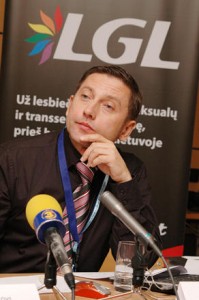 Through education, support, and representation of the LGBT community, LGL promotes an inclusive social environment for gay men, lesbian women, bisexual and transgender persons.
Through education, support, and representation of the LGBT community, LGL promotes an inclusive social environment for gay men, lesbian women, bisexual and transgender persons.
Lithuanian Gay League is a national nonprofit, nongovernmental organization uniting homosexual, bisexual, and transgender persons, a member of the International Lesbian and Gay Association (ILGA) since 1994. In 1993 a constituent meeting took place. The first issue of the monthly LGL newsletter “Amsterdamas” was published. In the winter of 1995 the first lesbian and gay center opened its doors. In the spring of 1995 the Lithuanian Gay League was officially registered with the Ministry of Justice. It is one of the longest-existing NGO’s in the country.
Over the years, organization has implemented a number of projects, e.g. the first survey in the three Baltic countries on discrimination on the grounds of sexual orientation; a project entitled Challenges to Family Law and Policy in Europe, followed by publications, seminars throughout the country, and the photo exhibition Living Together; The coordination of the EC initiative EQUAL project on workplace diversity was so far the biggest and most ambitious project undertaken by the organization.
LGL is running LGBT support and information centre in capital Vilnius since 2004. Current projects include collaboration with Swedish national LGBT federation RFSL for community empowerment, legal support for improvement of LGBT rights with partners from Italy, France and Poland. LGL was a co-host of ILGA-Europe annual conference 2007. This year we are working closely with the Baltic partners and Amnesty International to make the second Baltic Pride march and conference a breakthrough event for LGBT human rights in Lithuania.
Besides these projects, the LGL has also been active in lobbying: it put forward amendments prohibiting discrimination on the grounds of sexual orientation, which were later included in the Penal and Labour codes. The LGL monitors legislation and submits proposals regarding the improvement of social conditions for LGBT persons.
LGL also includes youth group, which unites young gay men, lesbian women, bisexual and transgender persons aged up to 27 years. We engage in educational activities, e.g. publish materials, build websites, etc., support our peers (establish a help line, support groups, coming out groups), join different social activities, e.g. sports, movie screenings, discussions, etc., learn and have fun together, e.g. camping, participating in various youth activities at home and abroad, cooperate with other European LGBT youth organizations/groups or networks.
(2)
Homozigotai (Homozygotes) is an LGL group uniting homosexual couples/families in Lithuania that was established in the spring of 2004. This group concentrates on developing mean of communication, socializing between homosexual couples in Lithuania, and communicating with other similar groups and associations abroad.
Visitors are kindly invited to submit questions on Homozygote activities: http://www.publika.lt/apklausa-15-4d3fce5dccd8e.html. It has published a Lithuanian version of the booklet ‘Our Daughters and Sons’ originally composed in the United States by PFLAG–Parents and Friends of Lesbians and Gays.
The booklet is an attempt to answer the questions which have no easy answers for parents who know that their child is gay or lesbian. It is also useful for those who think their child might be homosexual and do not know what to do.
www.pflag.org/fileadmin/…/Our_Daughters_and_Sons_Final_03.pdf (English)
http://www.freewebs.com/homozigotai/musu-dukterys-ir-sunus_internetui.pdf (Lithuanian)
LGL Association has also released a new practical guide for those interested in their rights and willing to defend them. Feel safe! http://homozigotai.webs.com/Bukletas
(3)
TRACE–Transnational cooperation for equality
The project TRACE is founded under the EU program Equal, a project aimed at combating discrimination in working place. The project involves four countries: Lithuania, Slovenia, France and Sweden. The common interest is to abolish discrimination and the inequality of lesbian, gay and bisexual persons in the area of employment and enabling LGBT persons to work under circumstances that are equal to their colleagues.
“It is a fundamental human right to live, work and love in accordance with your true identity. Nevertheless, lesbians, gay men and bisexuals are facing negative attitudes in their working places.
Employers, trade unions, governmental public bodies and NGOs work together with TRACE against discrimination on grounds of sexual orientation.”
Army of Police for Lithuania’s First Gay Parade
From: Agence France Presse
May 8, 2010
By Adam Mullett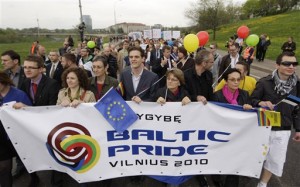
Lithuania took a step toward real integration into the European Union by staging its first-ever gay pride parade in the capital city Vilnius. The Baltic Pride 2010 parade ‘For Equality’ finally went ahead after a temporary permit revocation just days before the scheduled event. Conservatives in the highly Catholic country had repeatedly tried to block.
See the video: Video: http://www.youtube.com/watch?v=0k49gb1OPow&feature=player_embedded#!
Artūras Rudomanskis, head of the Youth Tolerance Association and one of the co-organisers of the parade, told Baltic Reports that on the eve of the march, their office had its windows smashed by rocks. Two Molotov cocktails were thrown, but no fire started. One of the glass jars filled with petrol did not smash, giving police a record of the criminal’s fingerprints.
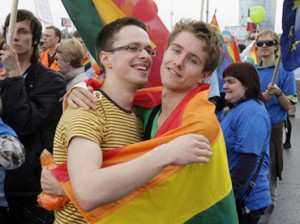 With this incident in mind, hundreds of participants met at the Conti Hotel near the city center and were bused to the river esplanade where they assembled and started playing drums. Already at 11.30 a.m., half an hour before the parade was due to start, anti-gay protesters were waving banners and chastising police.
With this incident in mind, hundreds of participants met at the Conti Hotel near the city center and were bused to the river esplanade where they assembled and started playing drums. Already at 11.30 a.m., half an hour before the parade was due to start, anti-gay protesters were waving banners and chastising police.
Despite several charges at the barricades and smoke bombs, plastic bottles and uncooked sausages thrown at police by the anti-gay protesters, there was no violence only 12 arrests, which included several members of parliament. Seimas member Petras Gražulis, the mouthpiece of the anti-gay movement in the country, was among those taken away by police.
There had been rumors originating from the Interim Prosecutor General Raimondas Petrauskas that anti-gay radicals would attack the participants upon entrance and exit to the parade, but when the buses rolled up to the perimeter of the fenced area, only the teal fatigues of the Vilnius police force could be seen. The barricades were hundreds of meters from parade route, leaving the anti-gay protesters largely out of sight for parade participants.
Police Kept Guard
Immediately upon exiting the buses, participants, which hailed from all over the world, unfurled flags and began beating drums, blowing whistles and clashing cymbals. In the background, over 800 police in full riot gear kept guard as the parade winded along the river from Forum Palace to the grassy area in front of the Reval Hotel on the northern banks of the Neris.
Politicians From Europe Joined the Parade
Seimas member Rokas Žilinskas was posing for the cameras with the huge rainbow flag and told Baltic Reports that although he had been skeptical at first, he was out campaigning for human rights, not only gay rights. “Lithuania isn’t purely gay and it isn’t purely homophobic. There are different kinds of people — radicals who are for and radicals who are against. There are moderates who are for and moderates who are against and this constitutes grounds for discussion and I believe that in this discussion the truth will be found,” Žilinskas said. “After this weekend, temperatures will drop down and discussion will continue and Lithuania will find the truth and will face it.”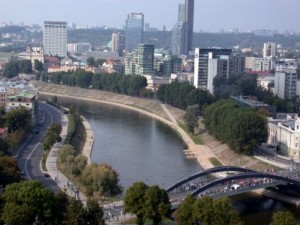
“Initially I was skeptical about the parade as I much prefer open discussion … but this about human rights and every citizen must understand this. That is is why I changed my mind and came. I came here to protect my rights,” Žilinskas said.
Read the full story
Also see:
Gay Lithuania News & Reports 1999 to Present on GlobalGayz.com
Gay Lithuania social media website
LGBT film festival ‘Kitoks kinas’
The first LGBT film festival ‘Kitoks kinas’ is organised by Equal Rights & Social Development Centre in collaboration with Lithuanian Gay League and with kind support of the Royal Netherlands Embassy in Vilnius as well as other sponsors. For more detailed information about the programme of the festival, please visit
Vilnius Soho Gay Club
Soho club in Vilnius is now the only gay club in the capital of Lithuania. A pleasant and welcoming atmosphere, good service, large dance floor, sometimes a drag show. (2010)

